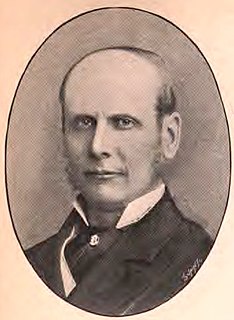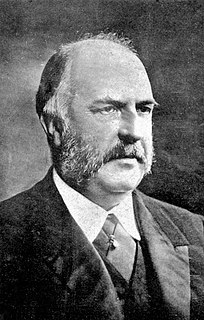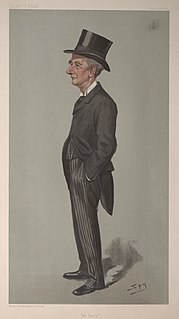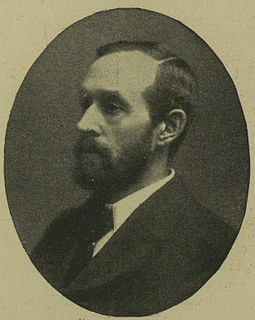Francis Moses Coldwells (1832 - 29 July 1895) was a British businessman and Liberal Party politician. [1] [2]

The British people, or the Britons, are the citizens of the United Kingdom of Great Britain and Northern Ireland, the British Overseas Territories, and the Crown dependencies. British nationality law governs modern British citizenship and nationality, which can be acquired, for instance, by descent from British nationals. When used in a historical context, "British" or "Britons" can refer to the Celtic Britons, the indigenous inhabitants of Great Britain and Brittany, whose surviving members are the modern Welsh people, Cornish people, and Bretons. It may also refer to citizens of the former British Empire.

The Liberal Party was one of the two major parties in the United Kingdom with the opposing Conservative Party in the 19th and early 20th centuries. The party arose from an alliance of Whigs and free trade Peelites and Radicals favourable to the ideals of the American and French Revolutions in the 1850s. By the end of the 19th century, it had formed four governments under William Gladstone. Despite being divided over the issue of Irish Home Rule, the party returned to government in 1905 and then won a landslide victory in the following year's general election.
Born in Stoke Newington, he was educated in the British School there. At one time he occupied the office of harbourmaster at Brading, Isle of Wight before moving to Croydon in the southern suburbs of London where he established a tailoring business. [2] [1] Elected to Croydon Local Board, he was one of the main proponents of the incorporation of Croydon as a borough, and was one of the first members of the town council, elected an alderman, following the granting of a charter in 1883. [3] He was subsequently a justice of the peace for the borough. [1] [2] He was also a member of Croydon School Board. [1] He was also a temperance activist as a leading member of the Band of Hope. [1]
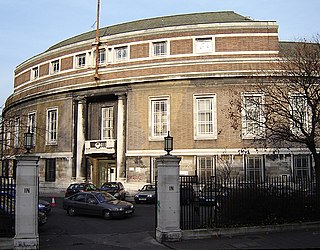
Stoke Newington is an area occupying the north-west part of the London Borough of Hackney in north-east London, England. It is 5 miles (8 km) north-east of Charing Cross. Stoke Newington Church Street was the site of the original hamlet of Stoke Newington, which in turn gave its name to Stoke Newington the ancient parish.

The ancient 'Kynges Towne' of Brading is the main town of the civil parish of the same name. The ecclesiastical parish of Brading used to cover about a tenth of the Isle of Wight. The civil parish now includes the town itself and Adgestone, Morton, Nunwell and other outlying areas between Ryde, St Helens, Bembridge, Sandown and Arreton. Alverstone was transferred to the Newchurch parish some thirty years ago.

The Isle of Wight is a county and the largest and second-most populous island in England. It is in the English Channel, between 2 and 5 miles off the coast of Hampshire, separated by the Solent. The island has resorts that have been holiday destinations since Victorian times, and is known for its mild climate, coastal scenery, and verdant landscape of fields, downland and chines.
At the 1892 general election he was elected to the House of Commons as Member of Parliament for Lambeth North, with a majority over his Liberal Unionist opponent, Henry Morton Stanley, of 130 votes. [4] [1] [2]

The 1892 United Kingdom general election was held from 4 July to 26 July 1892. It saw the Conservatives, led by Lord Salisbury, win the greatest number of seats, but not enough for an overall majority as William Ewart Gladstone's Liberals won many more seats than in the 1886 general election. The Liberal Unionists who had previously supported the Conservative government saw their vote and seat numbers go down.

Lambeth North was a borough constituency centred on the Lambeth district of South London. It returned one Member of Parliament (MP) to the House of Commons of the Parliament of the United Kingdom, elected by the first past the post system.
The Liberal Unionist Party was a British political party that was formed in 1886 by a faction that broke away from the Liberal Party. Led by Lord Hartington and Joseph Chamberlain, the party formed a political alliance with the Conservative Party in opposition to Irish Home Rule. The two parties formed the ten-year-long coalition Unionist Government 1895–1905 but kept separate political funds and their own party organisations until a complete merger was agreed in May 1912.
Coldwells was a director of the Liberator Building Society, established by Jabez Balfour, the first Mayor of Croydon. After the collapse of the company Coldwells was pursued through the courts for large sums of money by some of the society's shareholders. [5] He described himself as being "slowly killed with worry", and did not defend his parliamentary seat at the next election in 1895. [2] Shortly before his death it became clear he faced a criminal trial at the High Court. [6] [2]

Jabez Spencer Balfour was an English businessman, British Liberal Party politician and fraudster.

The 1895 United Kingdom general election was held between 13 July and 7 August 1895. It was won by the Conservatives led by Lord Salisbury who formed an alliance with the Liberal Unionist Party and had a large majority over the Liberals, led by Lord Rosebery. The Irish Parliamentary Party was split at this time, the majority of its MPs following John Dillon whilst a rump followed John Redmond.

The High Court of Justice in England is, together with the Court of Appeal and the Crown Court, one of the Senior Courts of England and Wales. Its name is abbreviated as EWHC for legal citation purposes.
He was found dead in a summer house in Bournemouth shortly after leaving parliament. At the inquest into his death it was found that he died from heart failure, possibly aggravated by stress. [2]
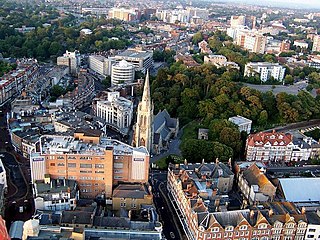
Bournemouth is a coastal resort town on the south coast of England, east of the 96-mile-long (155 km) Jurassic Coast, a World Heritage Site. At the 2011 census, the town had a population of 183,491, making it the largest in Dorset. With Poole to the west and Christchurch in the east, Bournemouth is part of the South East Dorset conurbation, which has a population of 465,000.

